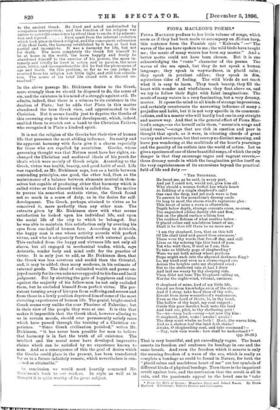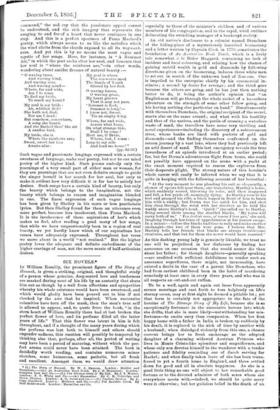FIONA MACLEOD'S POEMS.*
FIONA MACLEOn prefixes to her little volume of songs, which seem as if they had been made to accompany an 2Eolian harp, this sentence from the Finnish epic " Kalevala " :—" The waves of the sea have spoken to me ; the wild birds have taught me ; the music of many waters has been my master." And a better motto could not have been chosen. But it is one acknowledging the "runic" character of the poems. The waves of the sea speak, but they do not speak a human language; they speak in waywardness, in placid calm ; they speak in petulant eddies ; they speak in dim, mysterious tides of feeling. The wild birds do not teach what it is easy to learn. They teach beauty, they fill the heart with wonder and wistfulness ; they float above us, and we try to follow their flight with faint imaginations. The music of many waters is a very fascinating, but a very dreamy, master. It opens the mind to all kinds of strange impressions, and certainly counteracts the narrowing influence of many a, prejudice and habit, but it is not very specific in its communi- cations, and is a master who will hardly lead one in any straight and narrow way. And that is the general effect of Fiona Mac- leod's songs,—as she herself calls them, " mountain songs and island runes,"—songs that are rich in emotion and poor in thought that speak, as it were, in vibrating chords of great variety and sweetness, but that convey no distinct meaning, and leave you wondering at the multitude of the heart's yearnings and the paucity of its outlets into the world of action. Let us give a specimen of one of these beautiful songs, of which the only danger is that they encourage vague and vagrant reverie,— those dreamy moods in which the imagination prides itself on the very capriciousness of its excursions beyond the practical, field of life and duty:— "THE SHEPHERD,
He loved me, as he said, in every part,
And yet I could not, would not, give him all :
Why should a woman forfeit her whole heart At bidding of a single shepherd's call ?
One vast the deep, and yet each wave is free To answer to the noonshine's drowsy smile Or leap to meet the storm-wind's rapturous glee : This heart of mine a wave is oftenwhile.
Depth below depth, strange currents cross, re-cross,. The anguished eddies darkly ebb and flow, But on the placid surface seldom toss The reckless flotsam of what seethes below : O placid calms and maelstrom heart of me, Shall it be thus till there be no more sea ?
I am thy shepherd, love, that on this hill Of life shall tend and guard thee evermore.'
These were thy words that far-off day, and still Lives on thy echoing lips this bond of yore.
Yet who wert thou, 0 soul as I am, thus To take so blithely gage of shepherding ?
Were we not both astray where perilous Steps might each into the abysmal darkness fling?
Lo, my tired soul even as a storm-stayed ewe Across the heights unto my shepherd cried : But to the sheltered vale at last I drew And laid me weary by thy sleeping side.
Thou didst not hear The Shepherd calling us, Nor far the night-wind, vibrant, ominous.
O shepherd of mine, lord of my little life, Guard me from knowledge even of the stress : And if I stray, take heed thou of thy wife, Errant from mere womanhood's wantonness.
Even as the Lord of Hosts, lo, in thy hand, The hollow of thy hand, my soul support : Guide this poor derelict back unto the land And lead me, pilot, to thy sheltering port !
No—no—keep back—away—not now thy kiss : O shepherd, pilot, wake ! awake ! awake !
The deep must whelm us both ! Hark, the waves hiss,.
And as a shaken leaf the land cloth shake!
Awake, 0 shepherding soul, and take command !— —Nay, vain vain words : how shall he understand ? "
(pp. 28-294
That is very beautiful, and yet exceedingly vague. The heart asserts its freedom and confesses its bondage in one and the same breath. And even the freedom which it asserts is only the seeming freedom of a wave of the sea, which is really as complete a bondage as could be found in Nature, for both the " placid calms and maelstrom heart of me" are but symbols of different kinds of physical bondage. Then there is the impatient revolt against love, and the confession that the revolt is all in vain, and the passionate appeal to the loved one to "take • From the Hilts of Dream: Mountain Songs and Island Banes. By Fiona Macleod. Edinburgh: Patrick Geddes and Colleagues. command," the sad cry that the passionate appeal cannot be understood, and the rich imagery that represents the swaying to and fro of a heart that never continues in one stay. And this is a perfect specimen of Fiona Macleod's poetry, which always seems to us like the melodies which the wind elicits from the chords exposed to all its wayward- ness. And yet this is by no means the most vague and mystic of her songs. Here, for instance, is " A Summer Air," in which the poet seeks after her soul, and laments that her soul is " where the rainbows are,"—in other words, wandering about amidst dreams of natural beauty :—
My goal is where The sea-waves meet The Sands of Youth Stirred by her feet.
0 waving leaves, 0 waving grass, My heart grieves That it may not pass.
' Summer is fleet, Summer is long,'— I know not, Sweet, 'Tis an empty Song.
Where, far and wide, Across what foam, On what strange tide, Shall I be come ? Meet me, 0 Bride,
Where, lost, I roam : Leap to my side
And lead me home!"
(pp. 32-33.)
'Such vague and passionate longings expressed with a certain sweetness of language, make real poetry, but not to our mind poetry of the higher kind. Such poems embody only the yearnings of a very small part of either man or woman, for they are yearnings that are not even definite enough to guide the singer herself in her search for her soul, but only to make it evident how very difficult it is for her to satisfy her desires. Such songs have a certain kind of beauty, but only the beauty which belongs to the imagination, not the beauty which belongs to reason and imagination blended in one. The finest expression of such vague longings has been given by Shelley in his more or less pantheistic lyrics. But then Shelley found for them an utterance even more perfect, because less incoherent, than Fiona Macleod. It is the incoherence of these aspirations of her's which makes us feel, after reading a good many of her songs, that while we have unquestionably been in a region of real beauty, we yet hardly know which of our aspirations her verses have adequately expressed. Throughout her verse we move about in a world " not realised." But the higher poetry loves the adequate and definite embodiment of the higher cravings of man, not the mere music of half-articulate desires.
0 waving trees, And waving wind, And waving seas, And waving mind— Where, far and wide, Am l to roam 'To find my bride, To reach any home ?
My soul is my bride : Ah, whither fled?
She hath not died, Nor am I dead : But somehow, somewhere, A song she heard, And she flashed thro' the air A sunfire bird.
My bride, she is Where the rainbows are; Sweet, sweet her kiss Awaits afar :























































 Previous page
Previous page